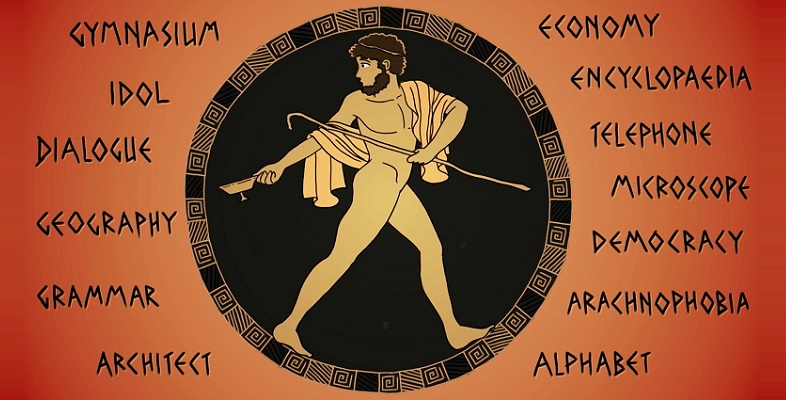3 εἰμί, I am
The verb ‘to be’, along with its forms such as ‘am’, ‘is’, ‘are’ or ‘was’, is the most common linking verb in Greek. Here are three forms of the present tense, which indicates a state of affairs in the present (‘is/are’) rather than the past (‘was’) or the future (‘will be’). The complete list of all the forms of a verb is called its ‘conjugation’.
- εἰμί I am
- ἐστί(ν) he/she/it is
- εἰσί(ν) they are
Recall that Greek does not need to state the personal pronoun explicitly. Personal pronouns such as ἐγώ (‘I’) are supplied only for emphasis. The letter nu in brackets following ἐστί and εἰσί (so-called ‘movable nu’) is used when the next word begins with a vowel, or at the end of a sentence.
The complement takes the same case as the subject, i.e. the nominative case:
ὁ Θεμιστοκλῆς ἐστι στρατηγός
Themistocles is a general
If the complement is an adjective, it also ‘agrees with’ its subject in gender and number as well as case. This is the grammatical concept of ‘agreement’. This course won’t go into adjectives in detail here, but the endings of some adjectives, like καλός (‘beautiful) are almost identical to the endings of the definite article:
Aphrodite is beautiful
ἡ Ἀφροδίτη ἐστὶ καλή
The teachers are wise
οἱ διδάσκαλοί εἰσι σοφοί
The plans are foolish
αἱ βουλαί εἰσι μῶραι
As usual, Greek word order can be flexible:
ὁ Θεμιστοκλῆς στρατηγός ἐστιν
καλή ἐστι ἡ Ἀφροδίτη
Activity 4 Forms of εἰμί
Which form of εἰμί would be needed to translate the verb in these sentences?
a.
εἰμί
b.
ἐστί
c.
εἰσί
The correct answer is b.
a.
εἰμί
b.
ἐστί
c.
εἰσί
The correct answer is b.
a.
εἰμί
b.
ἐστί
c.
εἰσί
The correct answer is c.
a.
εἰμί
b.
ἐστί
c.
εἰσί
The correct answer is a.
a.
δοῦλος
b.
δοῦλον
The correct answer is a.
Discussion
A complement is expected after ἐστί. The sentence means ‘Xanthippos is a slave’. (You may recall from Session 5 that Greek does not have a word equivalent to ‘a’ or ‘an’.)
